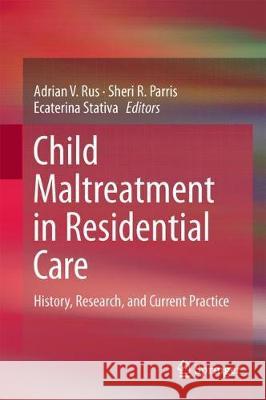Child Maltreatment in Residential Care: History, Research, and Current Practice » książka



Child Maltreatment in Residential Care: History, Research, and Current Practice
ISBN-13: 9783319579894 / Angielski / Twarda / 2017 / 527 str.
Child Maltreatment in Residential Care: History, Research, and Current Practice
ISBN-13: 9783319579894 / Angielski / Twarda / 2017 / 527 str.
(netto: 613,40 VAT: 5%)
Najniższa cena z 30 dni: 616,85
ok. 22 dni roboczych.
Darmowa dostawa!
An Introduction to Maltreatment of Institutionalized Children.- Institutional Neglect in Romania’s Long-Term Residential Centers in the 1990s from the Perspective of Children’s Rights.- Punishment, Peer-Exploitation, and Sexual Abuse in Long-Term Romanian Residential Centers: Findings from a Nationally Representative Sample of Institutionalized Children.- Academic Achievement of Romanian Institutionalized Children: A Social-Ecological Approach.- The Prevalence of Stunting Among the Romanian Institutionalized Children Placed in Long-Term Institutional Settings in the 1990s.- Psychopathology Following Severe Deprivation: History, Research, and Implications of the Bucharest Early Intervention Project.- Poly-Victimization and Mental Health Problems Among Adolescents in Residential Facilities in Spain.- Child Sexual Abuse in Religiously Affiliated and Secular Institutions in Germany.- Research on Child Sexual Abuse in Institutions in German-Speaking Countries – A Summary .- Family Environment in Institutions for Young Children in Russia: Mental Health and Development versus Medical Care.- Institutional Care in Ukraine: Historical Underpinnings and Developmental Consequences.- Divergent Developmental Pathways of Children and Adolescents Reared in Long-Term Residential Protective Care in Turkey.- Experiences of Victimization by Peers and Staff in Residential Care for Children At-Risk in Israel from an Ecological Perspective.- Structural Neglect in Orphanages: Physical Growth, Cognition, and Daily Life of Young Institutionalized Children in India.- Child Maltreatment and Prevention Practices in Chinese Orphanages.- Child Abuse and Neglect in Charitable Children’s Institutions in Uasin Gishu County, Kenya: A Challenge of Context.- Interaction Competencies with Children (ICC) – An Approach for Preventing Violence, Abuse and Neglect in Institutional Care in Sub-Saharan Africa.- Why Institutions Matter: Empirical Data from 5 Low- and Middle-Income Countries Indicate the Critical Role of Institutions for Orphans.- Institutional Care Environments for Infants and Young Children in Latin America and the Caribbean.- Experiences and Outcomes of Adults who Endured Maltreatment as Children in Care in Australia in the Twentieth Century.- Congregate Care Settings in the United States.- Best Practices for Residential/Institutional/Group Care of Children: A Harm Reduction Framework.- Interventions Designed for Children with Histories of Institutionalization and Placed in Foster or Adoptive Families.- Child Maltreatment in Residential Centers: Summing Up.
Adrian V. Rus, Ph.D., received his doctorate in Psychology in 2012 with an emphasis in experimental psychology from Texas Christian University. Dr. Rus currently teaches for Southwestern Christian University in Bethany, Oklahoma. Much of his research is focused on abuse and neglect of Romanian institutionalized children, although he also has a scientific interest in topics such as children and mother’s health, parenting, and personality. His studies have been published in high quality peer-reviewed journals such as Child Abuse and Neglect, Child Abuse Review, European Journal of Contraception and Reproductive Health Care, and European Journal of Public Health, among others.
Sheri R. Parris, Ph.D., is a Research Scientist at Texas Christian University with extensive writing and editing experience, as well as research experience in the fields of psychology and education. She has previously co-edited three educational textbooks, co-authored many book chapters, and has published articles in peer-reviewed journals such as Child Abuse Review, Child Abuse & Neglect, Child Welfare, Child and Youth Services, Children and Youth Services Review, Contemporary School Psychology, Journal of Educational Psychology, Journal of Evidence-Informed Social Work, among others.
Ecaterina Stativa, Ph.D., is a senior Research Scientist, sociologist, at the National Institute for Mother and Child Health “Alessandrescu-Rusescu” in Bucharest, Romania. She has extensive research experience on many aspects of child abandonment, institutionalization, neglect, and maltreatment. She has also led a large number of the national representative studies on different public health topics regarding mother and child health, for the Romanian Government and International Agencies. Her studies have been published as research reports and articles in prestigious peer-reviewed journals.
This data-rich volume reviews short- and long-term consequences of residential or institutional care for children across the globe as well as approaches to reducing maltreatment. Up-to-date findings from a wide range of developing and developed countries identify forms of abuse and neglect associated with institutionalization and their effects on development and pathology in younger children, adolescents, and alumni. The sections on intervention strategies highlight the often-conflicting objectives facing professionals and policymakers balancing the interests of children, families, and facilities. But despite many national and regional variations, two themes stand out: the universal right of children to live in safety, and the ongoing need for professionals and community to ensure this safety.
Included among the topics:
- Maltreatment and living conditions in long-term residential institutions for children
- Outcomes from institutional rearing
Child Maltreatment in Residential Care will inform psychology professionals interested in the role of residential care in the lives of children, and possibilities for improved outcomes. It will also interest social workers and mental health practitioners and researchers seeking evidence-based interventions for families adopting children from residential care.
1997-2026 DolnySlask.com Agencja Internetowa
KrainaKsiazek.PL - Księgarnia Internetowa









